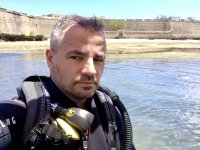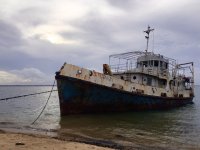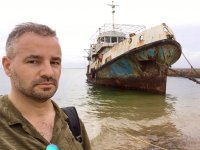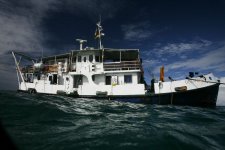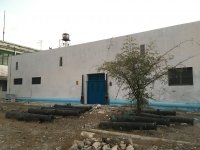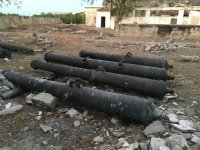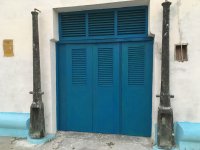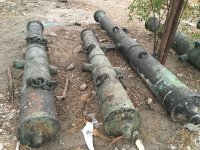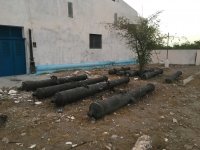Training on Underwater Archaeology for African countries takes place in Mozambique Island
UNESCO courses in Africa © UNESCO, 01-13 December 2019
UNESCO organizes in cooperation with the Ministry of Culture of Mozambique and the local CAIRIM Centre for Underwater Archeology a two-week intensive training In Mozambique Island. It will familiarize African experts with the core principles of underwater cultural heritage management, research and conservation. Lessons include theoretical and practical exercise in order to increase capacity and stimulate collaboration. The training will be based on the scientific standards set out by UNESCO 2001 Convention.
Participants – cultural heritage experts, archaeologists, historians and conservators – will gain the necessary skills to research underwater cultural heritage by using recording and evaluation techniques. They will also focus on learning about technical and legal protection, as well as the importance of the underwater cultural heritage for society and future generations.
Africa has a rich maritime cultural past, which is an important part of its identity. Native African populations, ancient Indo-Roman traders, Arab seafarers and Portuguese discoverers — numerous ships travelled the region’s shores, be it for war or for commerce or to trade slaves. Today, Africa’s waters hold a rich maritime cultural resource closely connected to tangible coastal heritage, diverse maritime communities and living culture, such as traditional boat building or water related traditions.
This immensely rich heritage constitutes a precious legacy important for cultural identity and local pride, constituting also a source for scientific information and tourism income.
Unfortunately, in particular the underwater cultural heritage of Africa is under serious threat from treasure hunters, uncontrolled industrial development and lack of supervision. Many countries in Africa are experiencing rapid industrialization. Increasing population density creates a yet unprecedented pressure on their cultural resources. Pillage has moreover increased and dozens of most significant shipwrecks have been looted over the last years, their artefacts being sold off to the art market or the microchip industry.
Over the last years, especially Mozambique’s waters saw intensive treasure hunting on shipwrecks. These wrecks could have been the center-point of a tourism diving industry that would have provided a livelihood for the local community and the collections for a major museum. Many of them, however, were destroyed despite the vivid protest of local scientists. Now the local authorities and communities, with the help of UNESCO, seek to turn back the wheel of time and protect the wrecks, which are in many cases also a testimony of the slave-trade.
Training on Underwater Archaeology for African countries takes place in Mozambique Island | United Nations Educational, Scientific and Cultural Organization
UNESCO courses in Africa © UNESCO, 01-13 December 2019
UNESCO organizes in cooperation with the Ministry of Culture of Mozambique and the local CAIRIM Centre for Underwater Archeology a two-week intensive training In Mozambique Island. It will familiarize African experts with the core principles of underwater cultural heritage management, research and conservation. Lessons include theoretical and practical exercise in order to increase capacity and stimulate collaboration. The training will be based on the scientific standards set out by UNESCO 2001 Convention.
Participants – cultural heritage experts, archaeologists, historians and conservators – will gain the necessary skills to research underwater cultural heritage by using recording and evaluation techniques. They will also focus on learning about technical and legal protection, as well as the importance of the underwater cultural heritage for society and future generations.
Africa has a rich maritime cultural past, which is an important part of its identity. Native African populations, ancient Indo-Roman traders, Arab seafarers and Portuguese discoverers — numerous ships travelled the region’s shores, be it for war or for commerce or to trade slaves. Today, Africa’s waters hold a rich maritime cultural resource closely connected to tangible coastal heritage, diverse maritime communities and living culture, such as traditional boat building or water related traditions.
This immensely rich heritage constitutes a precious legacy important for cultural identity and local pride, constituting also a source for scientific information and tourism income.
Unfortunately, in particular the underwater cultural heritage of Africa is under serious threat from treasure hunters, uncontrolled industrial development and lack of supervision. Many countries in Africa are experiencing rapid industrialization. Increasing population density creates a yet unprecedented pressure on their cultural resources. Pillage has moreover increased and dozens of most significant shipwrecks have been looted over the last years, their artefacts being sold off to the art market or the microchip industry.
Over the last years, especially Mozambique’s waters saw intensive treasure hunting on shipwrecks. These wrecks could have been the center-point of a tourism diving industry that would have provided a livelihood for the local community and the collections for a major museum. Many of them, however, were destroyed despite the vivid protest of local scientists. Now the local authorities and communities, with the help of UNESCO, seek to turn back the wheel of time and protect the wrecks, which are in many cases also a testimony of the slave-trade.
Training on Underwater Archaeology for African countries takes place in Mozambique Island | United Nations Educational, Scientific and Cultural Organization



